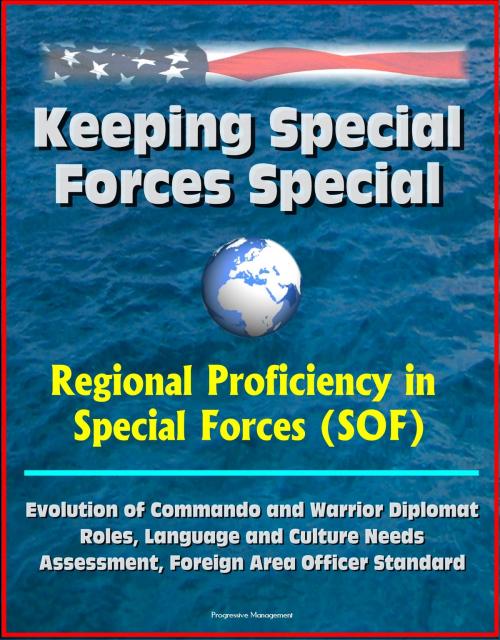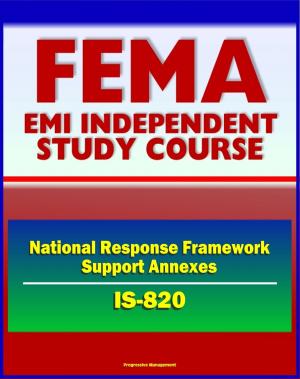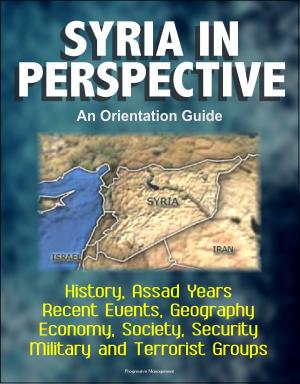Keeping Special Forces Special: Regional Proficiency in Special Forces (SOF) - Evolution of Commando and Warrior Diplomat Roles, Language and Culture Needs Assessment, Foreign Area Officer Standard
Nonfiction, History, Military| Author: | Progressive Management | ISBN: | 9781311086037 |
| Publisher: | Progressive Management | Publication: | January 24, 2016 |
| Imprint: | Smashwords Edition | Language: | English |
| Author: | Progressive Management |
| ISBN: | 9781311086037 |
| Publisher: | Progressive Management |
| Publication: | January 24, 2016 |
| Imprint: | Smashwords Edition |
| Language: | English |
Professionally converted for accurate flowing-text e-book format reproduction, this unique book examines military regional proficiency. Regional proficiency is a critical capability in irregular warfare (IW). In preparation for increased engagement in irregular warfare, the Department of Defense (DoD) and the Military Services made several significant improvements in developing regional proficiency. While the DoD is attempting to create a new capability in the majority of the Total Force, Special Forces was created to succeed in an IW environment. As a result of its design, Special Forces valued and developed regional proficiency long before this became topical in DoD. Oddly, the last decade of overseas contingency operations that spurred interest in regional proficiency in DoD overall has also threatened regional proficiency development in Special Forces. An analysis of Special Forces training and development reveals that the Special Forces' primary means of developing regional proficiency is through deployment experience. While the Special Forces Groups are regionally aligned, several have consistently deployed outside of their Area of Responsibility (AOR) to support combat operations in Iraq and Afghanistan. A survey and a series of interviews were conducted to determine the state of regional proficiency interest in Special Forces. Through survey analysis, several trends were identified. With this information, this thesis concludes with a suggested strategy to improve regional proficiency in Special Forces non-commissioned officers (NCOs).
In 2001, Afghanistan suddenly became the most interesting place on Earth for the United States defense establishment. Raised from obscurity to the highest national priority, Afghanistan became the primary interest for our national security organizations. People with knowledge and experience in Afghanistan were suddenly some of the most valuable resources in the federal government. The United States needed people with field experience and knowledge of the region to spearhead operations in Afghanistan. The 5th Special Forces Group (Airborne) (SFG(A)) was the Special Forces unit aligned with the region that included Afghanistan. Then-COL Mulholland, the commander of 5th SFG(A) at the time, stated that Special Forces lacked "precise knowledge" on Afghanistan because there had been little association with the country since the 1980s.
Only a few men had the regional and operational expertise required to conduct the operation in Afghanistan. Gary Schroen, a man about to retire from the Central Intelligence Agency (CIA), was the most qualified of a very small group. Over the course of a career, Schroen had developed extensive regional knowledge of Afghanistan and had personally dealt with many of the Northern Alliance commanders. Had the timing of 9/11 been different, Schroen could have retired and there would have been no one with the same ability within the federal government capable of executing the required mission. The nation was lucky to have Gary Schroen.
Another example of luck is found in the British example of T.E. Lawrence. T.E. Lawrence was already an accomplished scholar on Arabia when World War I erupted. Lawrence escaped duties as a desk officer and became the most accomplished unconventional warrior of modern times by being a military advisor to the Arab tribes. What is notable about both cases is that the person' s regional expertise went largely unrecognized until a crisis manifested. In the face of crisis, what was largely obscure knowledge can become one of the most significant items in a military strategy. It was only by luck that both nations had these types of individuals at hand at the right time. The United States should not have to depend on luck to meet its national security needs.
Professionally converted for accurate flowing-text e-book format reproduction, this unique book examines military regional proficiency. Regional proficiency is a critical capability in irregular warfare (IW). In preparation for increased engagement in irregular warfare, the Department of Defense (DoD) and the Military Services made several significant improvements in developing regional proficiency. While the DoD is attempting to create a new capability in the majority of the Total Force, Special Forces was created to succeed in an IW environment. As a result of its design, Special Forces valued and developed regional proficiency long before this became topical in DoD. Oddly, the last decade of overseas contingency operations that spurred interest in regional proficiency in DoD overall has also threatened regional proficiency development in Special Forces. An analysis of Special Forces training and development reveals that the Special Forces' primary means of developing regional proficiency is through deployment experience. While the Special Forces Groups are regionally aligned, several have consistently deployed outside of their Area of Responsibility (AOR) to support combat operations in Iraq and Afghanistan. A survey and a series of interviews were conducted to determine the state of regional proficiency interest in Special Forces. Through survey analysis, several trends were identified. With this information, this thesis concludes with a suggested strategy to improve regional proficiency in Special Forces non-commissioned officers (NCOs).
In 2001, Afghanistan suddenly became the most interesting place on Earth for the United States defense establishment. Raised from obscurity to the highest national priority, Afghanistan became the primary interest for our national security organizations. People with knowledge and experience in Afghanistan were suddenly some of the most valuable resources in the federal government. The United States needed people with field experience and knowledge of the region to spearhead operations in Afghanistan. The 5th Special Forces Group (Airborne) (SFG(A)) was the Special Forces unit aligned with the region that included Afghanistan. Then-COL Mulholland, the commander of 5th SFG(A) at the time, stated that Special Forces lacked "precise knowledge" on Afghanistan because there had been little association with the country since the 1980s.
Only a few men had the regional and operational expertise required to conduct the operation in Afghanistan. Gary Schroen, a man about to retire from the Central Intelligence Agency (CIA), was the most qualified of a very small group. Over the course of a career, Schroen had developed extensive regional knowledge of Afghanistan and had personally dealt with many of the Northern Alliance commanders. Had the timing of 9/11 been different, Schroen could have retired and there would have been no one with the same ability within the federal government capable of executing the required mission. The nation was lucky to have Gary Schroen.
Another example of luck is found in the British example of T.E. Lawrence. T.E. Lawrence was already an accomplished scholar on Arabia when World War I erupted. Lawrence escaped duties as a desk officer and became the most accomplished unconventional warrior of modern times by being a military advisor to the Arab tribes. What is notable about both cases is that the person' s regional expertise went largely unrecognized until a crisis manifested. In the face of crisis, what was largely obscure knowledge can become one of the most significant items in a military strategy. It was only by luck that both nations had these types of individuals at hand at the right time. The United States should not have to depend on luck to meet its national security needs.















